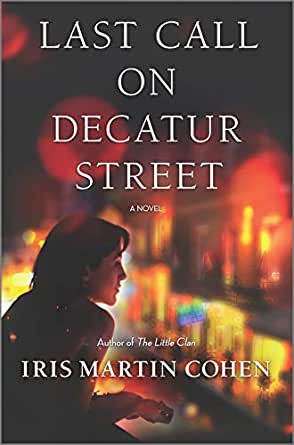
Friendships and Race: A New Orleans Coming of Age Story
Yona Zeldis McDonough: This novel is, among other things, a coming of age story. What does Rosemary learn from her wild, wacky night? Is the fact that it is January 4, a night that ushers in the Epiphany, significant?
Iris Martin Cohen: I think the book is definitely a coming of age story and about the passage to adulthood. In Rosemary’s case, this process is about learning to see the world around her more honestly and clearly. We often believe the stories we are told as children about who were are and how the world works, and moving past those childish beliefs can be a difficult transition. During her wild night, Rosemary finally opens her eyes to some truths she had been unwilling to see about race in New Orleans and the ways she has benefitted from and participated in an unjust system. So she learns new things about herself, about her relationship with her childhood best friend, about her mother, but mostly she learns all the ways we try to run away from seeing what’s right in front of us. Yes, January 6th is the feast of the epiphany and for a catholic town like New Orleans, the day has a lot of resonance. Rosemary is not catholic, but this book is a lot about New Orleans and the way a town can shape you. Many of Rosemary’s virtues and failings could also be said about the town she lives in, she is charming and sexy and so much fun but there is a darkness to the glamor, a self-destructive tendency.
YZM: Rosemary lusts after one guy, sleeps with another, and has an aborted attempt with a third and yet it feels like the last encounter is the most intimate. Care to comment?
IMC: Rosemary does throw herself into flirtations and one night stands, I think mostly for distraction. She uses men and sex to avoid some of the pain in her life that comes down from her relationship with her mother. The last encounter is the most intimate, I agree. Over the course of the night, she is able to form a real relationship with the young punk who ends up latching on to her and her adventures. An honesty develops between them and she finds herself taking care of him. She becomes a mother to him in a way she never had for herself and it is a deeper, fleeting bond between them. It’s all a little grungy and sordid because that’s the demimonde they live in, but I think that last encounter is very sweet.
YZM: Both Gaby, who is Black, and Rosemary, who is Jewish, feel like outsiders at their Catholic school; what kind of bond does that create between them?
IMC: I think the bond of outsiders in any situation can often be very profound. It is extremely clear to Gaby and Rosemary that they are different from everyone else at their school and for Rosemary, in particular, that bond becomes the most important relationship in her life. She adores Gaby and clings to her like a drowning person. I think the relationship is a little more complicated for Gaby, there are more racial dimensions to being black in the south that Rosemary isn’t fully aware of. Gaby doesn’t have that luxury.
YZM: You’re a NOLA native—what kind of presence have Jews had there historically and what is their presence like now?
IMC: New Orleans has historically had a strong Jewish presence. As one of the nation’s most important ports, it has always been a city of immigrants and because of that has been a fairly tolerant and multicultural place. Jewish merchants and philanthropists have been fundamental in creating many of the city’s most beloved institutions from the New Orleans Museum of Art to our community college, hospitals, schools, and department stores. Jewish names have literally built so much of the city, but there is still a definite sense of separateness. Jews are excluded from the Mardi Gras krewes and social clubs of the city’s elite. So there is a funny double existence of making up the fabric of the civic space but still being very conscious of being outsiders. The Jewish community there now is large and thriving with its own special New Orleans flair.
YZM: This novel explores friendship as well as the ties between mother and daughter; is there a connection?
IMC: I’m sure there is a connection between the relationships we form most early in life with our parents and those we create later with our friends. I’m really interested in all varieties of intimacy and the complicated, intense ways humans depend on each other.



